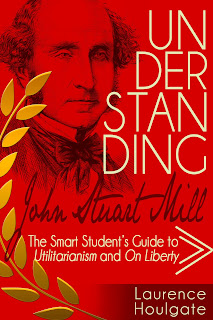PLATO REPUBLIC STUDY GUIDE
 Understanding Plato is the
prize-winning first philosophy study guide in the eight-book series of study guides on the classical
philosophers.
Understanding Plato is the
prize-winning first philosophy study guide in the eight-book series of study guides on the classical
philosophers.
The series is designed for beginning and intermediate philosophy students who
would like more depth than they would ordinarily get from books that
give only notes, brief summaries and outlines of the philosopher's thoughts and
theories.
Unlike other philosophy study books, each book in the series
focuses on both content and philosophical method.
Each chapter breaks down arguments of the philosopher into
understandable parts, showing how philosophers reaches their
conclusions and how they defend against possible
objections.
Each chapter concludes with a set of questions for thought and
discussion. Some of the questions are on topics that provide an
excellent starting point for term papers.
References to other books
about the philosopher or the topic can be found at the end of the
chapter, in footnotes, textboxes or at the back of the book.
Understanding Plato
contains a complete discussion of four of the early Socratic
dialogues (Euthyphro, Apology, Crito,
Meno) and Plato's longer and more famous work,
The Republic.
CONTENTS
Part I has four chapters with discussion questions about Plato’s
Socratic dialogues.
Part II has six chapters with discussion questions about the
most important ideas and theories in Plato’s Republic.
Part III is a summary and discussion of the nature of
philosophy, the difference between philosophy and science, and the unique methods
of philosophical reasoning.
DETAILED TABLE OF CONTENTS
1. INTRODUCTION
1.1
About the Smart Student’s Guide series
1.2
About Plato and Socrates
1.3
About this Book
PART I A GUIDE TO PLATO’S SOCRATIC
DIALOGUES
2. EUTHYPHRO: AN EXAMPLE OF
PHILOSOPHICAL METHOD
2.1 Examples are not Definitions
2.2 Quarreling Deities
2.3 Concurrence of the Gods
2.4 Piety as a Skill
2.5 Philosophical and Scientific
Method
Questions for Thought and Discussion
3. APOLOGY: THE TRIAL OF
SOCRATES
3.1
The Older Charges
3.2
The New Charges
3.2.1
An Inductive Argument
3.2.2
A Deductive Argument
3.2.3
Gods and Personal Daimons
3.3
Death, Justice and Civil Disobedience
3.4
Justice and Self-Preservation
3.5 .To Fear Death is “Blameworthy
Ignorance”
3.6
Injustice and Harm to Oneself
3.7
The Gadfly of Athens, the Unexamined Life and Obedience to the God
3.8
Closing Statement to the Jury
Questions for Thought and Discussion
4. CRITO: THE DUTY TO OBEY THE
LAW
4.1
Crito’s Plea
4.2
Socrates’ Response
4.2.1
The “One Man”
4.2.2
The Duty Never to do Injustice to Anyone
4.2.3
The Authority of the Law
4.3
Plato’s Method for Determining Right and Wrong
Questions for Thought and Discussion
5. MENO: VIRTUE, KNOWLEDGE AND
IMMORTALITY
5.1
Attempts to Define Virtue
5.1.1
Virtue Defined by Examples
5.1.2
Virtue as the Ability to Rule
5.1.3
Virtue as the Power to Acquire Good Things
5.2
Can Virtue Be Taught?
5.3
Knowledge and True Belief
5.4
Meno’s Paradox
5.5
The Theory of Recollection
5.6
A Brief Critique of Socrates’ Solution
Questions for Thought and Discussion
PART II A
GUIDE TO PLATO’S REPUBLIC
6. THRASYMACHUS’ CHALLENGE
6.1 Three Attempts
to Define Justice
6.1.1 Cephalus and
Polemarchus
6.1.2 Thrasymachus:
Justice as Political Power
6.1.3 The Ruler as
“One who Never Errs”
6.1.4 Do Rulers
Rule for the Good of Their Subjects?
6.1.5 A Lesson
about the Limit of Inductive Arguments
6.2 Is Injustice
More Profitable Than Justice?
6.2.1 The Unjust
City and the Unjust Person
6.2.2 Functions,
Virtues and Vices of the Soul
Questions for Thought and Discussion
7. A NEW ARGUMENT FOR INJUSTICE
7.1 Glaucon’s
Challenge
7.2 Renewing the
Argument of Thrasymachus
7.2.1 Forced Social
Contracts
7.2.2 The Unwilling
Practice of Justice
7.2.3 The Better
Life of Unjust Persons
7.3 Justice in the
City-State
7.3.1 A
Questionable Analogy
7.3.2 The Origin of
the Republic: Two Principles
7.3.3 The Minimal
City
7.3.4 The Luxurious
or “Feverish” City
7.3.5 The Guardians
of the City
7.3.6 Political
Power in the City
Questions for Thought and Discussion
8. THE ADVANTAGES OF JUSTICE
8.1 Searching for
Justice and Injustice
8.2 Justice and
Injustice in the City
8.3 Justice in the
Individual
8.4. A Proof that
the Soul has Parts
8.5 Names and
Functions of Parts of the Soul
8.5.1 Questions
About the Divided Soul Theory
8.5.2 The
Humunculus Problem
8.6 Justice and
Other Individual Virtues
8.7 Injustice in
the Soul
8.8 It is More
Profitable to be Just than Unjust
Questions for Thought and Discussion
9. Women, Marriage and Children
9.1 Women
9.2 Marriage
9.3 Children
Questions for Thought and Discussion
10. SUN, LINE AND CAVE
10.1
Philosopher-Kings
10.2 Forms and
Knowledge
10.3 The Analogy of
the Sun
10.3.1 The Sun as
an Offspring of the Good
10.4 Simile of the
Line
10.5 The Allegory
of the Cave
10.6 Knowledge of
the Good and Political Authority
Questions for Thought and Discussion
11. DEFECTIVE CONSTITUTIONS AND DAMAGED SOULS.
11.1 Imperfection
in Constitutions and Individuals
11.1.1 Timocracy
11.1.2 Oligarchy
11.1.3 Democracy
11.1.4 Tyranny
11.2 The
Tyrannical Soul
11.2.1 Ranking
Lives by Happiness
11.2.2 Ranking
Lives by Pleasure
11.2.3 Reason as
the Master of Desire
11.3 Injustice is
Never Profitable
Questions for Thought and Discussion
PART III
POSTSCRIPT: PHILOSOPHICAL METHOD
12. METHOD AND DISCOVERY
12.1 Philosophical
Problems
12.2 Philosophical
Method
12.3 Knowledge and
Discovery in Philosophy
12.4 Philosophy
and Science
APPENDIX
PHAEDO: THE LAST HOURS OF SOCRATES
REFERENCES
ABOUT THE
AUTHOR
Understanding Plato is available now at low cost in digital and print versions at
https://www.amazon.com/dp/B01I5GAIJI





